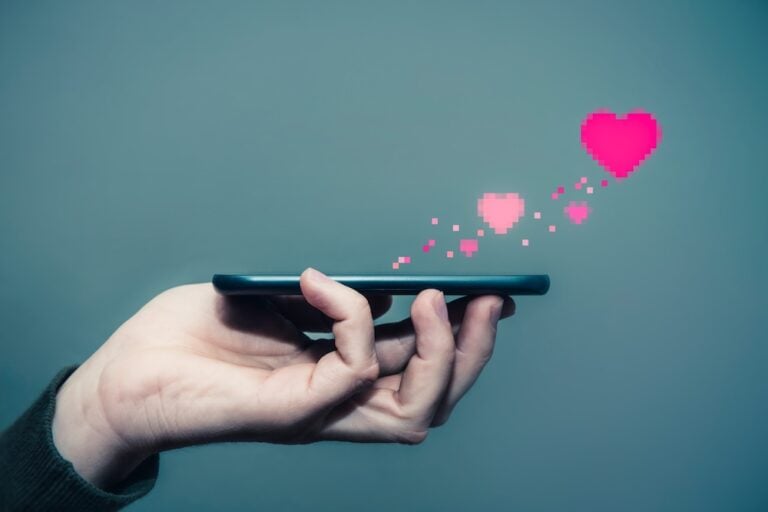
「エッチ?」(Sex?)
「すみません、会ったことがないんですから、ちょっと早くないですか?」(I’m sorry, but we’ve never met, so isn’t it a bit fast?)
「したくない?」(You don’t want to?)
「ちょっと…」(Well…)
「デブ」(Fatty)
I first encountered unfamiliar Japanese words like デブ (debu/fatty) when downloading Tinder.
Upon receiving such a message, I had never heard of the term before. I was a bit confused, so I showed it to my Japanese friend at the time, who was angered by the insult and explained its meaning to me. Admittedly, such childish insults were actually funny to me, but I soon came to learn that it wasn’t an isolated experience using online dating apps.
I was just 20 years old when I moved to Japan, and at that point, I had never been on a date or even kissed anyone. In many ways, I still felt like a child. While many of my friends used different dating apps, my options were limited because I needed a Japanese phone number.
So, I decided to give Tinder a try, only to find myself quickly overwhelmed by the influx of messages. These messages ranged from girls looking for friends to people wanting to practice English, and some were genuinely interested, while others resembled the abovementioned conversation.
I felt like an outsider, someone who had been plucked from a tiny cabin in the middle of the woods and thrust into the deep end of Osaka’s vast online dating scene.
However, despite the challenges and pitfalls I encountered through Tinder, it was also on this app that I met my current long-term boyfriend. So, I can safely say the experience is complicated.

What is the bad?
Although I have never dated outside of Japan, I can safely say many of the bad elements of online dating seem to be the same. Predatory men looking for one-night stands, awkward cases of sudden ghosting even after setting up a date and time, insults and pushy behavior, and so on. All are definitely part of online dating in Japan just as much as anywhere else.
However, one thing I didn’t expect was the amount of people genuinely searching for platonic matching. As a bisexual person, I had my app open both to men and women. Almost all of the women I saw wanted other female friends, not even looking for romance.
Paired with the experience of many of my male friends who struggled to get any match (both foreigners and Japanese), I can easily see why. It seems quite popular for women to look for platonic friends and ignore any sexual or romantic advances.
“Will you speak English with me?”
“Do you teach English?”
Likewise, as an obvious foreigner on the app, I was surprised by how many people had no interest in dating but wanted someone to practice English with.
However, while all those experiences are fairly benign, the biggest problem I ran into was the strong expectation for one-night stands or simply “friends with benefits.” In fact, there were even times men explicitly said things like, “I thought Western women were sexually liberated!”
While sexualization is a problem for all women, I found it was quite common for men I matched with to hardly see me as a viable option for dating and, at best, a potential English teacher or, at worst, a “sexually liberated” Westerner who likes no strings attached relationships.
This was not an isolated incident with Japanese men but rather a recurring theme in my dating experiences with various men. Surprisingly, one of my worst dates occurred with a fellow foreigner.
On this particular date, we met in a city between our respective residence places, and he took me to a Japanese restaurant. Despite living in Japan for two years, he struggled to read the menu and ordered the more expensive meal option, only to dislike it and request a change. However, he insisted on splitting the bill, so I had to pay for the more expensive meal rather than the cheaper meal I had ordered.
To make matters more uncomfortable, he led us to a nearby children’s park and tried to kiss me in front of a group of elementary schoolers, even after I had expressed my discomfort with it. The date concluded with me feeling panicked and headbutting him in the mouth, followed by a hasty retreat home on the train, claiming to have a “class” despite it being a Sunday.

What is the good?
Of the three boyfriends I have had, two I met online, and one I met in person.
One of the good parts of online dating in Japan is it helps break down some of the awkward barriers that make dating difficult in Japan.
Something you often hear in regards to dating in Japan is that “Japanese men are quite shy.” In many Western cultures, it’s quite common for men to approach women first, while in Japan, it may seem that men are more reluctant. Of course, this is an obvious generalization, but it has some level of truth.
However, I think the main issue is less that “Japanese men are shy” and more that there are fewer natural opportunities for men and women to meet organically. In Japan, there’s a large emphasis on boundaries. Because of this, men may hesitate to approach a woman outright.
At the same time, there tends to be a much stronger gender segregation than in countries like America. For example, female-only or male-only high schools and universities are still common, and it’s normalized to segregate female social spaces from male social spaces. For example, there are female-only Karaoke stores, train cars, and so on.
Even in the workforce, many offices or universities are heavily male dominated, resulting in fewer women, and of the women present, they often stick together and form their own group. Often, this is an attempt to create safe environments for women to live in, but a consequence is that once you’re outside of school, there are very few places for men to meet and befriend women who could become potential partners organically. In fact, this was the main reason my current boyfriend began using Tinder because in a fairly masculine field like carpentry, working six days a week, there were no places for him to meet a girl except online.
The benefit of dating apps is that when you match, it’s easy to assume that the other person is both open to the potential of dating and interested in you, making it easier for anyone to make the first move.
Another similar benefit is that anyone can download and use a dating app. This means you might meet people you could never meet in your daily life. While we never ended up dating, I was able to have interesting conversations with a diversity of people such as boxers, hosts working at host clubs, train conductors, and so on.
In fact, before we met online, there were times my current boyfriend and I crossed paths, having often eaten lunch at the same convenience store and using similar commuting routes. Even his dad and his grandma actually lived within the same neighborhood as me, but because our worlds were so separate (he was a carpenter and me an international graduate student), we never had anything prompt us to meet until we matched online.

What should I keep in mind?
One thing I had to learn quickly when coming to Japan is the phenomena like “gaijin hunters” or Japanese individuals exclusively seeking to date foreigners. In fact, one of my first dates was one of these very experiences where a Japanese man only wanted to date me because he wanted to experience intercourse with a foreign girl (as he explicitly said to a mutual friend).
However, one important thing to consider is that, while I am sharing my personal experiences, many of these experiences are specific to being a white girl. It is well-known that Japan has a deep-rooted history of colorism that may change an individual’s experience. Likewise, stereotypes and prejudices towards individual people groups may also affect one’s experience.
Another thing to note is that I personally struggled with LGBT+ dating, particularly in finding female matches online compared to male ones. Although Japan may not exhibit the same degree of hostility toward LGBT+ individuals as other countries, there remains a certain level of taboo surrounding such matters. Consequently, many gay or transgender Japanese individuals may feel less inclined to openly express their identities due to concerns about backlash from their families, which can significantly impact the online and offline dating experience.
While I never found a female match, I do have several gay friends who successfully met long-term partners through online dating. There are also plenty of pride events and gay bars in any major city where you can meet others if online dating doesn’t suit you personally.
It’s worth noting that fetishization can occur from both sides when dating in Japan. While certain general norms or trends may exist, it’s important to remember that a person is not a stereotype. You will likely find more enjoyable experiences if you approach dating with an open mind instead of seeking stereotypes.
Related Articles:
Dating in Japan – Meeting People, Dating Culture, Apps, and Love



















